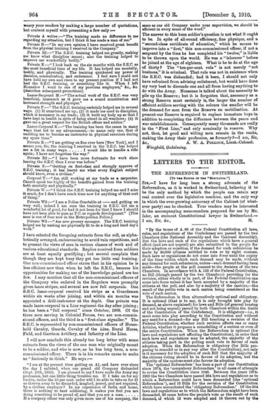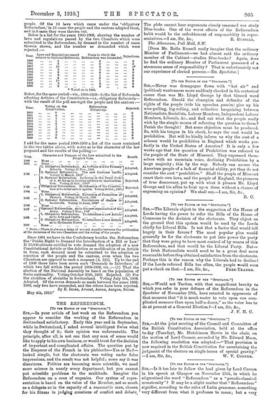LETTERS TO THE EDITOR.
THE REFERENDUM IN SWITZERLAND.
[To TIE EDITOE Of TIM "SPECTLTOP...1
Sra,—I have for long been a strong advocate of the Referendum, as it is worked in Switzerland, believing it to be the only method by which the people can retain any real control over the legislative machine, and the only way in which the ever-growing autocracy of the Cabinet (of what- ever party) can be checked. Your readers may be interested in the accompanying memorandum prepared for me by Mr.
"By the terms of A. 89 of the Federal Constitution all laws, rules, and regulations of the Confederacy are passed by the two Chambers (the National Assembly and the Cantonal Assembly). But the laws and such of the regulations which have a general effect (and are not urgent) are also submitted to the .people for their adoption or rejection, if the demand for such submission be made by 30,000 citizens entitled to vote or by eight cantons. Such laws or regulations do not come into force until the expiry of the time within which such demand may be made, without any demand for such submission, unless—such demand having been made—the people at the poll consent to the decision of the two Chambers. In accordance with A. 123 of the Federal Constitution, no Bill (though passed by the two Chambers) providing for the revision, either wholly or in part, of the Federal Constitution can come into force unless it has been accepted by a majority of the citizens at the poll, and also by a majority of the cantons,—the result of the public vote in each canton being considered as the vote of such canton.
The Referendum is then alternatively optional and obligatory. It is optional (that is to say, it is only brought into play by demand, as above explained) for laws and Bills (of general bearing and not being urgent) passed by both Chambers within the limits of the Constitution of the Confederacy. It is obligatory—i.e., it must come into play according to the Constitution and without any need for a demand—for any Bill touching a revision of the Federal Constitution, whether such revision affects one or mealy Articles, whether it proposes a remodelling of a section or even of the entire Constitution. When the Referendum is optional (for laws and regulations not affecting the Constitution), in order that such laws and regulations may be adopted, the majority of the citizens taking part in the polling must vote in favour of such adoption. When the Referendum is obligatory (for Bills pro- posing to remodel or in any way alter the Constitution), not only is it necessary for the adoption of such Bill that the majority of the citizens voting should be in favour of its adoption, but the majority of the cantons must also favour its adoption. The optional Referendum' has been a part of our Constitution since 1874, the 'compulsory Referendum' in all cases of attempts to revise the Constitution since 1848. Between the years 18'74- 1909 the two Chambers have passed 264 laws and regulations as to which a Referendum could have been demanded (the 'optional Referendum '), and 19 Bills for the revision of the Constitution which have necessitated the 'obligatory Referendum.' Of the 264 laws and regulations as to which the Referendum might have been demanded, 30 came before the people's vote as the result of such
demand, of which 12 were adopted and 18 thrown out by the
people. Of the 19 laws which came under the 'obligatory Referendum,' in 13 cases the people and the cantons adopted them, and in 6 cases they were thrown out. Below is a list for the years 1900-1909, showing the number of laws and regulations passed by the two Chambers which were submitted to the Referendum, by demand in the number of cases therein shown, and the number so demanded which were rejected :—
Laws and Regulations passed Cases in which the
Year. subject to Optional Referenda. Referendum was demanded. RejectIOns* 1900 1901...
1902 ...
1903 ...
1904 ...
1905 ...
1906 ...
1907 1908 ... 1909 • .• ... ..• ••• ..• ••.
....
...
—
5 6 10 5 6 6 4 19 s 2 ...
..• — _ ... ...
• .• ... —
...
..• _ ••• __
o 0 2 o 0 1 1 o 0
.•• — ... .•. — ''. ...
s ... ... ••• ... ...
m ...
...
• - 0 0 1* 0 0
o
0
o o
• Voted on in 1903.
Below, for the same period—viz., 1900-1909—is the list of Referenda affecting Articles of the Constitution—i.e., obligatory Referenda— with the result of the poll amongst the people and the cantons :— Referendum Rejected. Obligatory.
— 0 I add for the same period 1900-1909 a list of the cases contained in the two tables above, with notes as to the character of the law proposed and the results of the polling :—
Character and Purpose of the Law submitted to the Result. People's Vote.
1. ObligatoryReferendum. As .to St.ite Aia for Frimary 1 Adonted.
Schools. Voting 23 Nov., 19e2. .- ... ... -
2. Optional Referendum. The new Customs tariffs. t Ado,.,ted. Voting 15 March, 1903' ... ... ... ... ... j "' S. Optional Referendum. Inclusion in the Penal Code') I A. 48 Bis as to inciting soldiers to insubordina-} Rejected.
tion. Voting 25 Oct., 1903' ... ... ... _.
{ Obligatory Referendum. Modification of the Constitti- 1 ,,,,,oeted. tins as to retail sale of spirits. Voting 25 Oct...1903 j '''".'
1. Obligatory Referendum. Extension of Protection of }Adopted. 2. Optional Referendum. Regulations of dealeis in), ted. Ado 1 Patents. Voting 19 March. 1905 .... „.. ...
foodstuffs. Voting 10 June, 1906' ... ... ... - D {
Optional Referendum. A; to te new organisation of the I Adopted.
Army. Voting 3 Nov., 1907 — ... .- . . I 1. Obligatory Referendum. To introduce a new Article } Adopted. as to Arts . Obligatory Referendum. To introduce a new Article Ado o ted. as to Hydraulic Power ... ... ... ... ...} -
• NOTE.—There is always a delay of several months between the publication of the decisions of the two Chambers and the voting of the people.
Since 1891 we have in the Confederacy besides the Referendum the 'Public Right to Demand the Introduction of a Bill or Law.' If 50,000 citizens entitled to vote demand the adoption of a new Constitutional Article or the deletion or modification of an Article in force, such demand must be submitted to the adoption or rejection of the people and the cantons, even when the two Chambers are opposed to such a measure (A. 121). Up to the end of 1909 there have been seven such 'Demands to Introduce,' of which two fall within the period 1900-1909, viz. :—(1) That the election of the National Assembly be based on the population of Swiss nationality. Voting October 25th, 1902. Rejected. (2) For the abolition of absinthe in Switzerland. Voting July 5th, 1908. Adopted. Of the seven demands so made between the years 1892- 1009, only two have succeeded, and the others have been rejected. By E. 'smut, Avocet, Aarau, Aargau, Suisse.
May 4th, 1910."
Year.
1900 1901 1902 1903 1904 1905 1906 1907 1903 1909 Voting on the Constitution.
Year.
1900 1901 1002
103
1904 1006 1907











































































 Previous page
Previous page